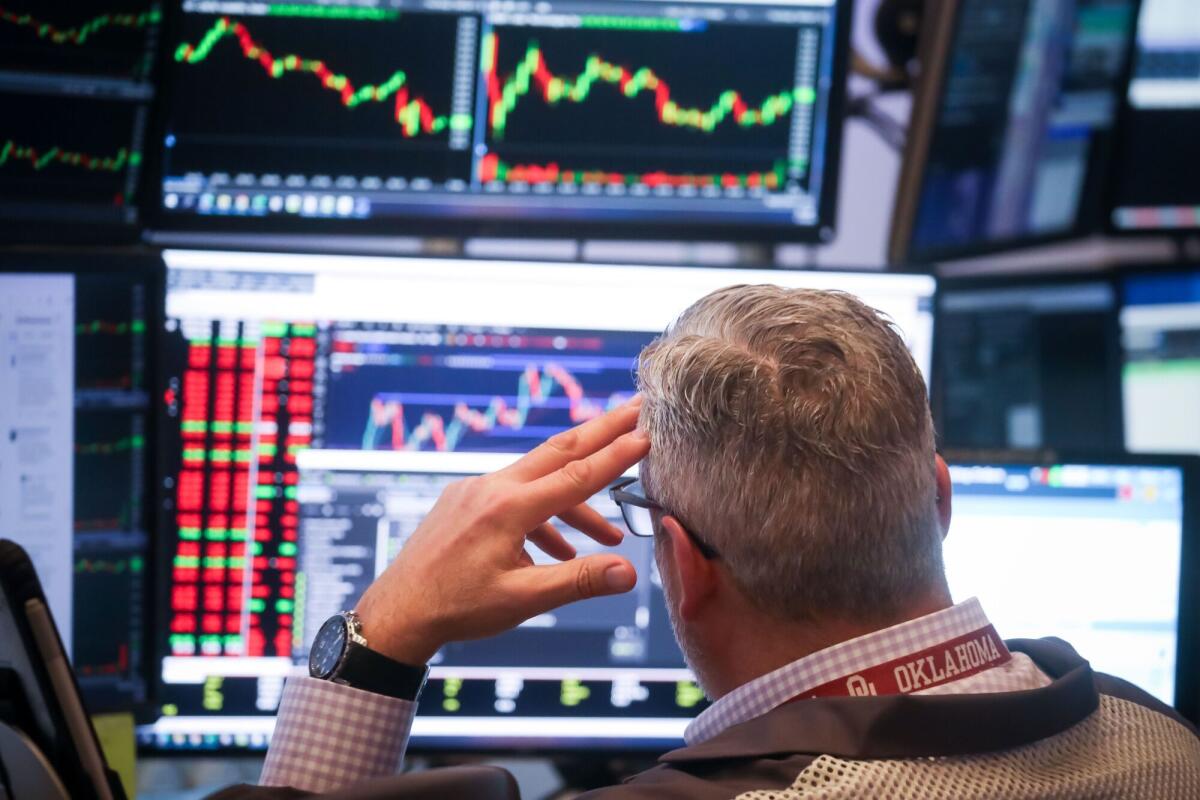Traders resist defensive stocks’ haven status amid Mideast risk

- Share via
U.S. equities investors are reluctant to seek safety amid flaring geopolitical tensions, raising the risk of getting caught off guard if the conflict between Israel and Iran takes an unexpected turn in the days ahead.
Normally, this level of anxiety would be enough to send money managers scurrying into stocks offering shelter, especially with President Trump weighing whether to offer Israel military backing in its conflict with Iran. That step could roil crude prices and stoke worries about inflation, and potentially reignite a rush for investment havens.
Yet, the events since last week have only triggered a modest shift into so-called defensive sectors such as utilities, consumer staples and healthcare. That’s even as U.S. stocks whipsaw their way higher, with the Standard & Poor’s 500 Index just 2.7% away from a new all-time high.
For Matt Maley at Miller Tabak + Co., it’s an ominous setup that leaves investors vulnerable given the fluid situation.
“The war may or may not get worse, but given that any upside potential for stocks is limited due to extended valuations, investors should be taking more precautions,” said the firm’s chief market strategist.
Underscoring how safer stocks have been on the sidelines lately, defensive sectors’ influence on the benchmark — measured by the combined weight of the groups in the gauge — is currently at a 35-year low, Strategas’ Todd Sohn found.
What’s more, a Goldman Sachs Group Inc. pair-trade basket that represents going long cyclicals and short defensives has seen a modest uptick since Israel launched airstrikes against Iran’s nuclear program and military targets last week.
If traders were rushing to safety due to concerns over the economy, the basket would decline, like it did in early April, when investors feared the impact of tariffs on growth. Trump will decide within two weeks whether to strike Iran, his spokeswoman said on Thursday.
Some say there’s good reason for investors to be reluctant to jump into defensives in the face of geopolitical unrest. First, data from UBS shows the impact of such events on equity markets tend to be short-lived. In the last 11 major geopolitical events, the S&P 500 on average fell just 0.3% one week after the event, while 12 months later it rose 7.7%.
According to Christopher Murphy, co-head of derivatives strategy at Susquehanna, positioning among hedge funds remained light. In other words, many institutional investors did not aggressively chase the recent rally higher, limiting their need for a forced pivot on geopolitical shocks.
Even on the day of strikes, investors showed little fear of a volatility breakout, and were adjusting their exposure and not exiting markets, the strategist said.
“Investors are still hedging with precision, but the dominant behavior remains risk-adjusted engagement — not panic,” he said.
That may be the case but there’s one outlier trade. Investors are piling into energy stocks, which tend to behave defensively in times when crude oil supply is at risk. Any escalating Iran-Israel conflict could push oil prices even higher.
Meanwhile, some market pros are starting to advise investors to make a bigger defensive move. The Wells Fargo Investment Institute recommended boosting exposure to such stocks amid the uncertainty surrounding tariffs that will extend through the rest of the year.
The utility sector stands out to Wells Fargo strategists. The group, which can act as a hedge against market volatility and economic risks, is relatively shielded from tariffs given the businesses are primarily domestic, they wrote in a note. Utilities are also set to benefit from the infrastructure buildout in artificial intelligence. Moreover, valuations are relatively favorable, they added.
The S&P 500 Utilities Index is trading at a forward price-to-earnings multiple of 17 times, compared to the S&P 500’s 22 times.
Dennis DeBusschere at 22V Research said he won’t be buying any surge in defensives, given the firm’s view that Israel will not strike Iran’s oil exporting facilities, thereby limiting the impact on interest rates and inflation expectations.
Dey writes for Bloomberg.
More to Read
Inside the business of entertainment
The Wide Shot brings you news, analysis and insights on everything from streaming wars to production — and what it all means for the future.
You may occasionally receive promotional content from the Los Angeles Times.










